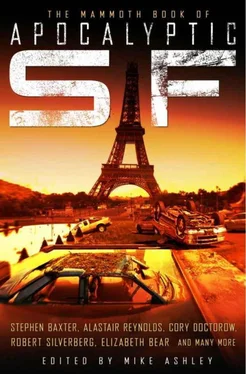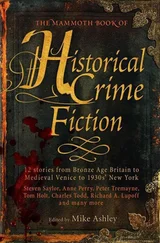Outside the smart tent, night came down. A.B. heard wolves howling, just like they did on archived documentaries. Wolves? No wolves existed. But someone was howling.
Tigerishka having sex. Sex with Thales. Bastard. Bad guy not only won the battle but got the girl as well…
A.B. awoke to the pins and needles of returning circulation: discomfort of a magnitude unfelt by anyone before or after the Lilliputians tethered Gulliver.
Tigerishka was bending over him, freeing him.
“Sorry again, apeboy, that took longer than I thought. He even kept his hand on the gun right up until he climaxed.”
Something warm was dripping on A.B.’s face. Was his rescuer crying? Her voice belied any such emotion. A.B. raised a hand that felt like a block of wood to his own face and clumsily smeared the liquid around, until some entered his mouth.
He imagined that this forbidden taste was equally as satisfying to Tigerishka as mouse fluids.
Heading north, the trundlebug seemed much more spacious with just two passengers. The corpse of Gershon Thales had been left behind, for eventual recovery by experts. Dessica-tion and cooking would make it a fine mummy.
Once out of the dead zone, A.B. vibbed everything back to Jeetu Kissoon and got a shared commendation that made Tigerishka purr. Then he turned his attention to his personal queue of messages.
The ASBO Squad had bagged Safranski. But they apologised for some delay in his sentencing hearing. Their caseload was enormous these days.
Way down at the bottom of his queue was an agricultural newsfeed. An unprecedented kind of black rot fungus had made inroads into the kale crop on the farms supplying Reboot City Twelve.
Calories would be tight in New Perthpatna, but only for a while.
Or so they hoped.
This story is indebted to Gaia Vince and her article in New Scientist, “Surviving in a Warmer World”
TERRAFORMING TERRA
Jack Williamson
Jack Williamson (1908-2006) almost made it to 100 years old, and he kept on writing to the end. He had the longest career of any SF writer, almost eighty years. His earliest story appeared in the very first science-fiction magazine, Amazing Stories, in 1928, showing the influence of Abraham Merritt. He became one of the major writers of the 1930s writing such bizarre
“thought variant” stories for Astounding Stories as “Born of the Sun” (1934), where it turns out that the planets are eggs and Earth is about to hatch. He produced his fair share of early space opera, notably his Legion of Space series, but also penned The Legion of Time (1938), where he highlighted the significance of those small moments, which he called the Jonbar hinge, upon which life-changing events can depend, His Seetee stories, written in the 1940s, gave rise to the concept of contra-terrene matter. At this time he produced another significant work, The Humanoids (1948), which considered the problem of an overly helpful artificial intelligence. Williamson’s fiction was often at the cutting edge of scientific advance. He considered genetic engineering in Dragon’s Island (1951), a theme he revisited in Manseed (1982). He continued to win Awards right to the end. The following novelette formed the first part of his novel Terraforming Earth (2001), which won the Campbell Memorial Award in 2002. This also takes us through the apocalypse and way beyond.
* * *
WE ARE CLONES, the last survivors of the great impact. The bodies of our parents have lain a hundred years in the cemetery on the rubble slope below the crater rim. I remember the day my robot-father brought the five of us up to see the Earth, a hazy red-spattered ball in the black Moon sky.
“It looks — looks sick.” Looking sick herself, Dian raised her face to his. “Is it bleeding?”
“Bleeding red-hot lava all over the land,” he told her. “The rivers all bleeding iron-red rain into the seas.”
“Dead.” Arne made a face. “It looks dead.”
“The impact killed it.” His plastic head nodded. “You were born to bring it back to life.”
“Just us kids?”
“You’ll grow up.”
“Not me,” Arne muttered. “Do I have to grow up?”
“So what do you want?” Tanya grinned at him. “To stay a snot-nosed kid forever?”
“Please.” My robot-father shrugged in the stiff way robots have, and his lenses swept all five of us, standing around him in the dome. “Your mission is to replant life on Earth. The job may take a lot of time, but you’ll be born and born again till you get it done.”
We knew our natural parents from their letters to us and their images in the holo tanks and the robots they had programmed to bring us up. My father had been Duncan Yare, a lean man with kind grey eyes and a neat black beard when I saw him in the holo tanks. He had a voice I loved, even when he was the robot.
The dome was new to us, big and strange, full of strange machines, wonderfully exciting. The clear quartz wall let us see the stark earth-lit moonscape all around us. We had clone pets. Mine was Spaceman. He growled and bristled at a black-shadowed monster rock outside and crouched against my leg. Tanya’s cat had followed us.
“Okay, Cleo,” she called when it mewed. “Let’s look outside.” Cleo came flying into her arms. Jumping was easy, here in the Moon’s light gravity. My robot-father had pointed a thin blue plastic arm at the cragged mountain wall that curved away on both sides of the dome.
“The station is dug into the rim of Tycho-”
“The crater,” Arne interrupted him. “We know it from the globe.”
“It’s so big!” Tanya’s voice was hushed. She was a spindly little girl with straight black hair that her mother made her keep cut short, and bangs that came down to her eyebrows. Cleo sagged in her arms, almost forgotten. “It — it’s homongoolius!”
She stared out across the enormous black pit at the jagged peak towering into the blaze of Earth at the center. Dian had turned to look the other way, at the bright white rays that fanned out from the boulder slopes far below, spreading to the pads and gantries and hangars where the spacecraft had landed, and reaching on beyond, across the waste of black-pocked, grey-green rocks and dust to the black and starless sky.
“Homongoolius?” Dian mocked her. “I’d say fractabulous!”
“Homon-fractabu-what?” Pepe made fun of them both. He was short and quick, as skinny as Tanya was, and just as dark. He liked to play games, and never combed his hair. “Can’t you speak English?”
“Better than you.” Dian was a tall pale girl who never wanted a pet. The robots had made dark-rimmed glasses for her because she loved to read the old paper books in the library. “And I’m learning Latin.”
“What good is Latin?” Cloned together, we were all the same age, but Arne was the biggest. He had pale blue eyes and pale blond hair, and he liked to ask questions. “It’s dead as Earth.”
“It’s something we must save.” Dian was quiet and shy and always serious. “The new people may need it.”
“What new people?” He waved his arm at the Earth. “If everybody’s dead-”
“We have the frozen cells,” Tanya said. “We can grow new people.”
Nobody heard her. We were all looking out at the dead moonscape. The dome stood high between the rock-spattered desert and the ink-black shadow that filled the crater pit. Looking down, I felt giddy for an instant, and Arne backed away.
“Fraidy cat!” Tanya jeered him. “You’re grey as a ghost.”
Retreating farther, he flushed red and looked up at the Earth. It hung high and huge, capped white at the poles and swirled with great white storms. Beneath the clouds, the seas were streaked brown and yellow and red where rivers ran off the dark continents.
Читать дальше












